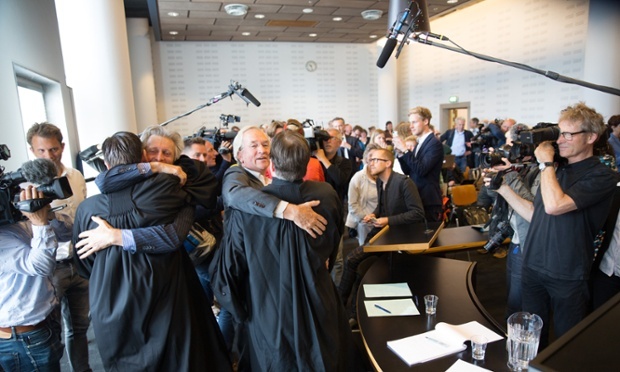HUGE CLIMATE CHANGE JUDGEMENT COULD INSPIRE A GLOBAL CIVIL MOVEMENT
Dutch ruling could trigger similar cases worldwide with citizens taking their governments to courts to make them act on climate promises
Urgenda ‘s legal team celebrating after court ruling in The Hague
Urgenda’s legal team celebrate on Wednesday after court ruling in the Hague that ordered the Dutch government to cut emissions by 25% within five years. Photograph: Chantal Bekker/Urgenda
“You have been negotiating all my life”, cried out 21-year-old Anjali Appadurai from the lectern of a UN climate change conference four years ago. The activist, speaking on behalf of her nation’s youth, could have speaking for anyone who has taken a mild interest in more than two decades of international negotiations on climate change and stood aghast as world leaders have failed to protect the most basic of human rights – to exist.
But today, thanks to 886 Dutch citizens who decided to sue their government, all of that may change. We may not have to wait for the politicians to save us – the lawyers may step in instead. In the first successful case of its kind, a judge in the Hague has ruled that the Dutch government’s stance on climate change is illegal and has ordered them to take action to cut greenhouse gas emissions by a hefty 25% within five years.
Lawyers say the precedent it sets could trigger similar cases all around the world. Already, in Belgium, 8, 000 citizens are preparing for a similar court case, with others pointing to another possible lawsuit in Norway. Although the case is only binding within the Netherlands, lawyers say that it will inspire lawyers and judges considering similar cases in many other countries.
“It is remarkable,” said James Thornton, chief executive of environmental law organisation ClientEarth. “A major sophisticated European court has broken through a political and psychological threshold. For the first time a court has ordered the government to protect its citizens from climate change.”
Thorton says that by using the principles of tort law, the case “returns to the fundamental power of the court to prevent harm – it is of great relevance to courts in other countries – every country in the world has tort law.” Thornton says that many others are currently considering climate litigation cases, including ClientEarth themselves.
Advertisement
In April, a group of prolific judges, advocates and professors launched the Oslo principles on global climate change obligations. Created by a group of prolific judges, advocates and professors, they argue that in failing to introduce adequate policy to tackle climate change, governments have already broken existing human rights, environmental and tort laws, regardless of agreements brokered at the international level.
But does a judge – generally appointed, not elected by citizens – have the right to order a policy change? It is a question that goes back to 1950s America and the fight against segregation in schools. In 1951, parents in the state of Kansas decided to file a lawsuit on behalf of their children. Others elsewhere followed suit and three years later the courts ruled that it was “inherently unequal” and therefore unconstitutional for the state to maintain separate education facilities. It was a major win for the civil rights movement and triggered integration in US schools.
Unfortunately for climate change campaigners in the US, the constitution does not hold the same protections for citizens’ environmental rights and it is this separation of powers that has prevented similar cases taking hold in the US, says Michael Gerrard of Columbia Law School.
He points to examples elsewhere where courts have successfully changed policy on environmental issues,such as cases against deforestation in the Philippines and a supreme court ruling in India that paved the way for Delhi’s buses to switch from diesel to compressed natural gas (CNG) to cut air pollution.
Nevertheless, he says the victory “will embolden lawyers in other countries, where active judiciaries are willing to issue rulings based on constitutional and human rights doctrines.”
The verdict will likely not only inspire lawyers, but the environmental movement, which is tired after 23 years of international negotiations. The multiple successes of the fossil fuel divestment campaign have provided a new, hopeful narrative of international relevance in recent years – and this court case could do the same.
Like the UK’s mass climate change lobby last week, this David and Goliath case shows that the climate change movement is not just made up of lentil-eating, sandal-wearing idealist liberals. All of the plantiffs who successfully sued their government today are Dutch citizens, crowdsourced by Urgenda, the environmental foundation behind the case.
Among this group of entrepreneurs, teachers, students, children and grandparents, are the famous Dutch DJ Gregor Salto, Dutch national weatherman Reinier van den Berg, and the wife of the late Wubbo Ockels, the first Dutch citizen in space. This case hasn’t been won by one David, but 886. Let’s hope there are many more.
More comment
Topics
Climate change Netherlands Europe Greenhouse gas emissions Fossil fuels Activism








Follow Us!